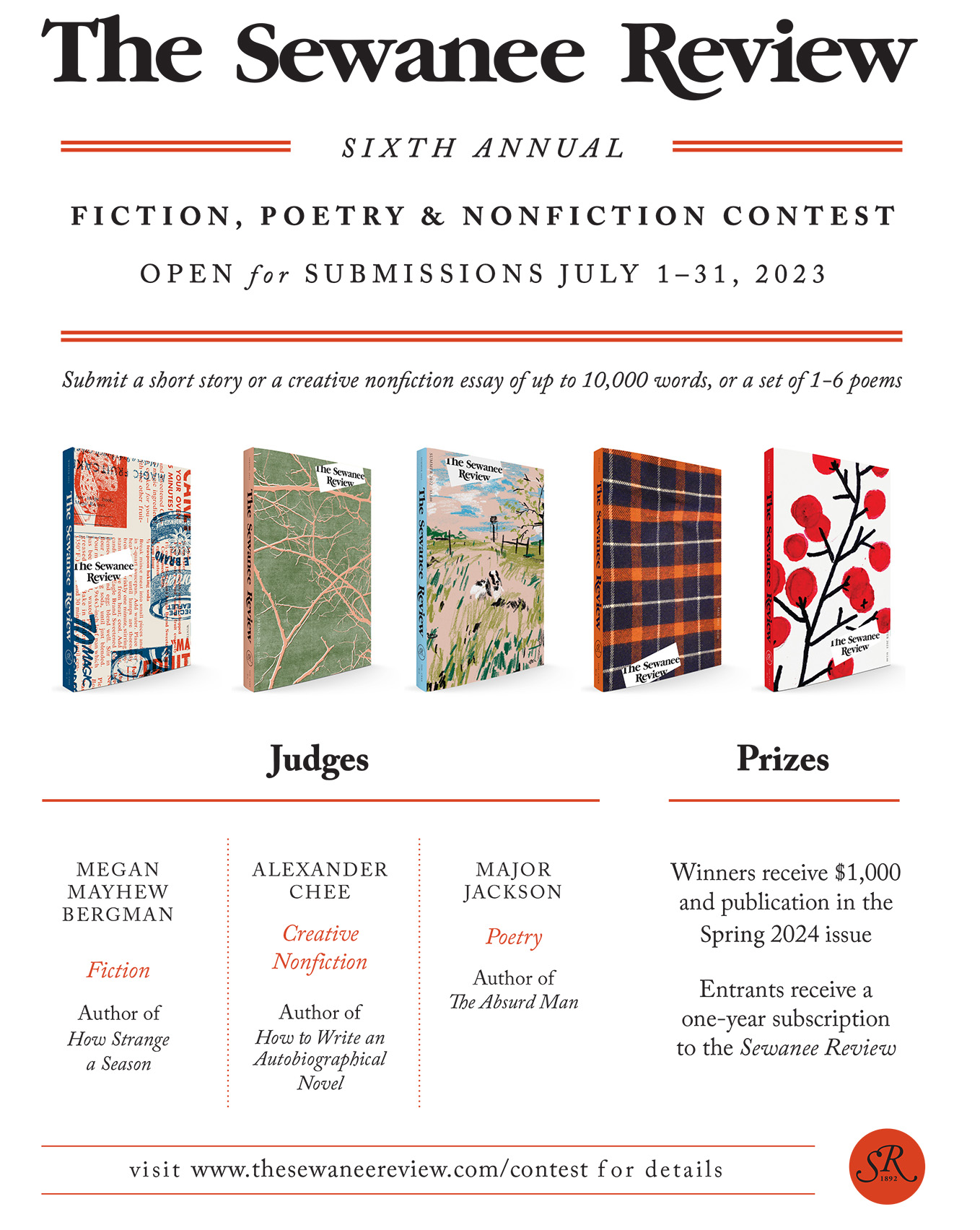Contest

This July, the Sewanee Review will hold its sixth annual Fiction, Poetry, and Nonfiction contest. This year's judges are Megan Mayhew Bergman in fiction, Alexander Chee in creative nonfiction, and Major Jackson in poetry. More information about the contest, including submission guidelines, will be available on our submittable page starting July 1.
This past July, the Sewanee Review held its sixth annual Fiction, Poetry, and Nonfiction Contest. This year we received over nine hundred submissions. Today we are pleased to announce the winners.
Fiction judge Megan Mayhew Bergman chose Maeve Barry’s short story “Girabella” as the winner for the fiction contest. Bergman writes, “‘Girabella’ has a fast, true potency and a convincing weirdness that has dashes of Flannery O’Connor crossed with Denis Johnson. The prose moves, the action coheres, and the main character pulses with troubled energy.”
“Dunsinane Close, Flat 3” by Claire Chee was selected as the runner-up. Of Chee’s story, Bergman says, “there is a maturity and knowingness in the voice and prose. The story is filled with fresh sentences, wisdom with bite, and relational truth. It's not just the characters we believe in but their entire ecosystem.”
Finalists for this year’s contest in fiction were: Lesley Bannatyne, Deirdre Collins, Gillian Esquivia-Cohen, Michelle C. McAdams, Leslie Pietrzyk, Jill Rosenberg, Emma Leokadia Walkiewicz, and Vicki Xu.
Alexander Chee chose Jacky Grey’s essay “Things of My Mother’s” as this year's nonfiction winner. Of the piece, Chee writes, “I had the feeling of watching someone build their world as they wrote the essay. An event happens: the discovery of a dress from a mother’s childhood, and with that, the discovery, in a way, of the mother. Present and hidden both in the family’s life, in the narrator’s life. And so the essay is like a trail through the woods that when completed is an outline of her life, the barest one, making remarkable use of the talismans left behind. Argentinean, Korean, queer, the child of a Korean adoptee, this narrator is trying to understand what it would mean to belong even to themselves.”
“Submersions” by Jasmin Sanderson was selected as the runner-up. “Submersions,” Chee writes, “is the sort of essay whose origins are written into the story, in this case in a playful, remarkable way. Two lovers agree to document their S&M play, and the result feels full of a sexual charge and intimacy that I think is only possible with the commitment and accountability present in this scene. A kind of wayfaring queerness, where the project is a reclamation of the self, a recuperation of possibility, and a prism made of desire.”
Finalists for this year’s contest in nonfiction were: T. Abeyta, Elizabeth Earley, Tina Essmaker, Miles Griffis, Oz Johnson, Susan Li, Emily Mathis, and Whitney Weiss.
In poetry, Major Jackson chose “Still Life with Sky, Coffee, Tulips, Anna Karenina, and God” by Shannon Pratson as the winner. Of Pratson’s poem, Major Jackson writes, “‘Still Life with Sky, Coffee, Tulips, Anna Karenina, and God’ clambers over a melancholic loneliness and despair to arrive at a solid meditation on faith and money. I enjoy the poem for its modest unfolding and colloquial speech rhythms (“and that’s about it”). Its pathos is rightly veiled behind a smirk that breaks into laughter. Humor exorcises whatever limitations the speaker feels—hope, prayer, literature, and language where “commas catch / in the drain.”
"Small Vices" by Eduardo Martinez-Leyva was selected as the runner-up. Jackson writes, “this poem comes from the throat, that is, a syntax that heralds a disjointed sensibility of “missing history[ies] / we wanted to piece back together.” The poem’s lyricism elegantly pans over a friendship that ultimately fails to steady an inheritance of addiction, suicidal ideation, and general sadness. The depth of ruin in this poem echoes the drama encountered in great Russian novels. It’s a smart poem whose music one can find on many a great vinyl albums but how joyous to encounter it here.”
Finalists for this year’s contest in poetry were: Ash Adams, Idris Anderson, Debbie Benson, Soma Mei Sheng Frazier, Mamie Morgan, Megan Pinto, Elisabeth Preston-Hsu, Alafia Sessions, Avia Tadmor, Kira Trainor, Joana Urtasun, and Edward Wilson.
In addition to receiving $1,000 each, the winners will be published in our upcoming Spring 2024 issue. Subscribe today so you don’t miss any of this incredible work.
In addition to receiving $1,000 each, the winners will be published in our upcoming Spring 2024 issue along with a craft essay by Holly Goddard Jones, prose by Joy Priest and Buku Sarkar, poetry by Patricia Smith and Michael Robbins, and more. Subscribe today so you don’t miss any of this incredible work.
